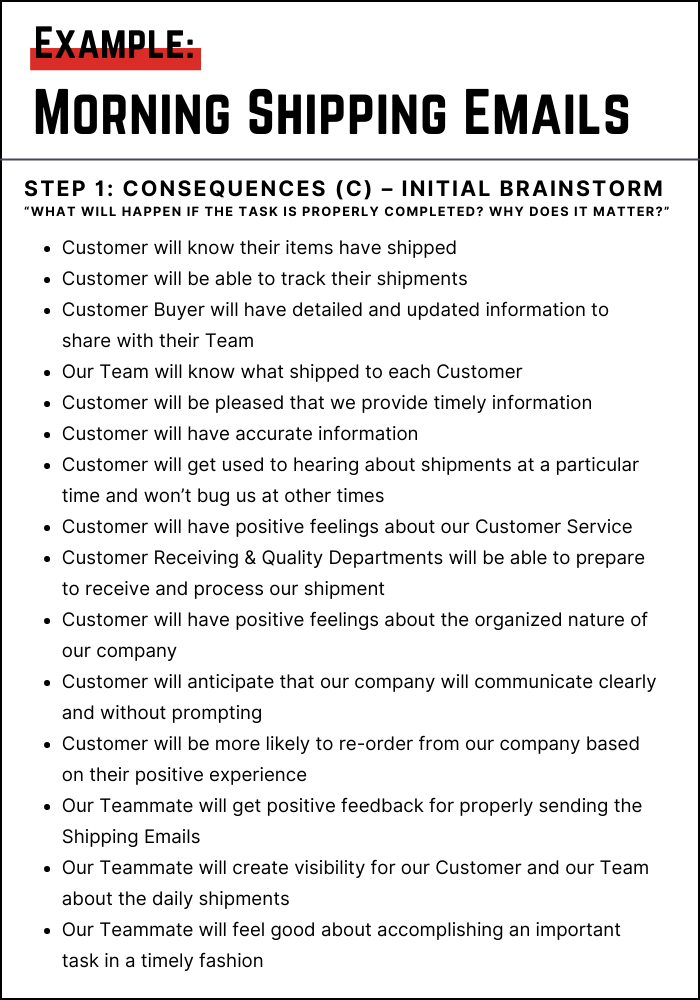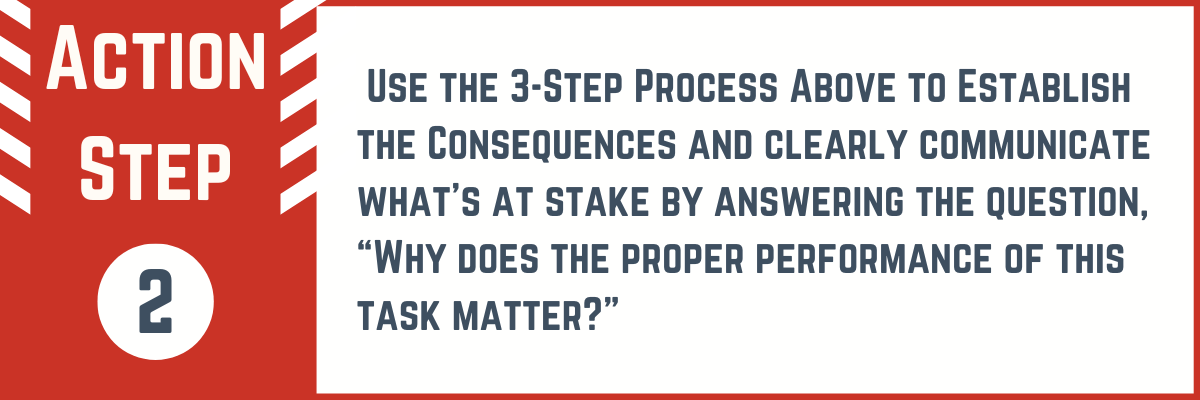How to Delegate with Confidence Series (Part 6 of 7)
You’re finishing setting things up to delegate an important item. You’ve identified the Desired Results (DR), the Guidelines (G), the Resources (R), and the Accountability process (A) for the task. Next, you’ll need to establish the Consequences (C) that you’ll use to explain what’s at stake as the task is considered. There are positive and negative Consequences, both individually and collectively, if the Desired Results are either achieved or not achieved.
In 7 Habits of Highly Effective People, Stephen Covey outlines the DR GRAC Delegation Process that has proven to be both solid and practical to use. Employed all over the world, the successful methodology helps slow down and clarify delegating so that Win-Win situations are established as the work gets done.
In this installment of our How to Delegate with Confidence Series, we’ll discuss the fifth and final step of the framework: the Consequences (C). Hopefully, in Steps 1-4 of the Series, you identified an item to delegate and have established your Desired Results (DR), your Guidelines (G), the available Resources (R), and the Accountability (A) practice for delegating the task. The next, and final, step to complete the delegation is to identify the Consequences (C) that will characterize the outcome as positive or negative. Establishing clearly what’s at stake can help provide the needed motivation to get the job done properly. If the reasons for why the outcome of the task matters are clear, it adds meaning and purpose to completing it correctly.
The Stakes in the Game – It’s What Makes Life Interesting!
In any good story, the hero has a problem to overcome. Whether she saves the day, or not, the hero’s struggle gives the reader a reason to pay attention. High-stakes stories capture our interest, whether it’s in the movies or in print. The stakes make the story interesting!
When delegating, you’re taking on a risk and there are at least a few things at stake. If the task didn’t matter, then you wouldn’t be doing it, let alone delegating it to someone else. Achieving the Desired Results (DR) matters to you and hopefully, you can transfer that sense of purpose to whomever you’re delegating the task to.
Building a strong case for the importance of the delegated task begins with determining the possible outcomes from its successful completion. If you can clearly communicate the Consequences (C), both good and bad, that will result based on how the task is performed, you can create additional clarity and motivation for the person taking on the task.
Consequences (C) – Step 1. Initial Brainstorm – “What Will Happen if the Task Is Properly Completed? Why does it matter?”
Take a few minutes and list the potential outcomes if the Desired Results are achieved. Why does it matter? The potential outcomes can be wide-ranging, so here are a few suggestions to get you started:
- Who will see the output of the task?
- How will it benefit others?
- Who is counting on the task to be completed?
- Are there financial impacts from the task getting completed?
- What follow-on actions would be able to happen after the task is completed?
- What feelings will be created from how the task gets completed?
- For each of the above questions, how will those ramifications be felt by:
- The team?
- The customer?
- The individual?
- Other interested parties?
Getting plenty of potential outcomes on the table will help make sure you’ve considered the broad scope of possible consequences that can result from the delegated task. Just getting them down in a list will help you organize your thoughts so that the person receiving the delegation will understand just what’s at stake when taking on this new task.

Consequences (C) – Step 2. Sort the Items by Importance (1-Star Through 5-Star) and Time Horizon (Short/Medium/Long)
Next, take the list you created and identify two aspects of each item:
How important do you feel the outcome is from 1-Star (low importance) to 5-Star (highly important)?
Is the outcome a short-term (S) or long-term (L) outcome?
By identifying these two characteristics for each item on the list, you’ll be able to group them for better communication and understanding as a part of the delegation process. Generally, it’s often easy to see the short-term, obviously positive outcomes for properly doing the task well. Providing added context for additional positive aspects of the task can enhance the transfer of ownership experienced by the person receiving the delegation. Adding the long-term aspects of the potential outcomes helps to create a more accurate vision of how this task fits into bigger-picture objectives.

Consequences (C) – Step 3. Organize the Consequences (C) for Clear Communication as Part of the Delegation
Finally, you’ll organize your list for communication as a part of the delegation to clearly establish why the task matters. A review of the Desired Results (DR) should be part of each stage just to make sure nothing gets lost along the way. By organizing your list based on the importance of the outcomes and the expected time horizons, you’ll create a clear understanding of what’s at stake in the delegation.
You’ve created your list based on all the positive Consequences (C) of what will be the outcomes if the Desired Results (DR) are achieved. Typically, the negative Consequences (C) that will happen if the task is not completed properly are just the opposite of everything on the first list. In some cases, there may be specific, or additional, negative ramifications if the task is not completed well. Highlighting the negative outcomes that are to be avoided can also help the person taking on the delegation understand what’s at stake, especially since people often respond to negative stakes more emotionally. Your goal is to ensure that the person receiving the delegation is very clear about what’s at stake and why the proper completion of the task matters.

Consequences (C) – Final Thoughts
This final part of delegating is all about making a case for why the task matters. You’ve used the prior elements to build a framework for the task and the last piece of the puzzle helps provide the motivation to complete the task well.
There is always something at stake when we perform tasks in our work. Being able to delegate those tasks effectively is enhanced if the person receiving the delegation understands those stakes and is motivated to achieve the Desired Results (DR) because achieving the Desired Results (DR) is the most important measure of success. It’s possible to delegate the task without clearly defining how important it is, but the effectiveness of the delegation is improved when the person receiving the delegation has the additional context.
We’ll wrap up our series next week by discussing how to take the DR GRAC framework we’ve outlined and put it into play in your work, so you can both delegate tasks effectively and add details to tasks that someone wants to delegate to you.
Here are your two Action Steps from this section:



